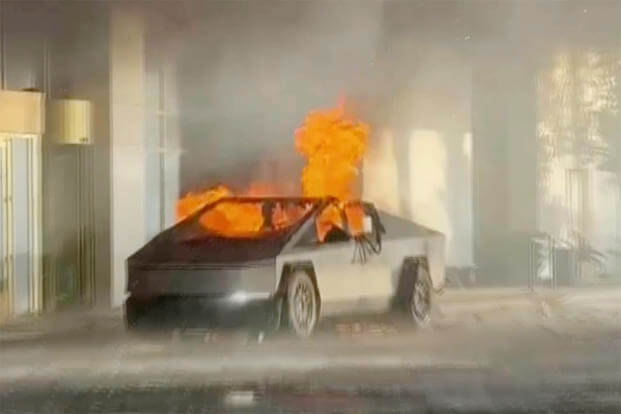Authorities have identified Master Sgt. Matthew Livelsberger, an Army Special Forces soldier, as the renter of the 2024 Tesla Cybertruck who was killed when the vehicle exploded outside the Trump International Hotel in Las Vegas on New Year’s Day.
Livelsberger, who was assigned to the 10th Special Forces Group headquartered at Fort Carson, Colorado, and stationed in Stuttgart, Germany, was at the center Thursday of an ongoing federal investigation, which included a search of a residence near Fort Carson. Livelsberger also owns property in the Cleveland area.
Livelsberger’s nearly 20-year military career began in 2006 when he enlisted directly into the Green Berets as a Special Forces communications specialist. He served on active duty until 2011, followed by brief stints in the National Guard and Army Reserve before returning to active duty in late 2012.
Read Next: New Orleans Attacker Served in Army for More than a Decade, Deployed to Afghanistan
Livelsberger died by a self-inflicted gunshot wound before the explosives — large fireworks and fuel canisters — detonated and injured seven others, according to authorities. It’s unclear what the motivation for the explosion was. He was a combat veteran, deploying to Afghanistan several times and earning numerous awards for valor, including a Bronze Star.
Livelsberger’s actions came on the same day that another Army veteran committed an act of terrorism thousands of miles away in Louisiana during New Year’s celebrations.
The perpetrator of the deadly vehicle ramming attack on New Orleans’ iconic Bourbon Street, which left at least 14 people dead and scores more injured, was identified as Army veteran Shamsud-Din Jabbar, a 42-year-old U.S. citizen from Texas. The FBI said that he also planted two improvised explosive devices along his route that did not detonate.
Investigators are still looking into whether the two incidents are related, but there was no evidence connecting the two as of Thursday morning. FBI Deputy Assistant Director Christopher Raia told reporters that the agency believed Jabbar acted alone, with no accomplices. However, Army officials refused to disclose Jabbar and Livelsberger’s full service record, to include what units they previously served in — which would show whether they crossed paths during their respective service. Those records are accessible and routinely disclosed.
“At this point, currently, we do not assess that anyone else was involved in this attack,” Raia said at a press conference.
Jabbar’s 12-year service in the Army was in support roles, as opposed to Livelsberger’s combat-focused jobs with Special Forces.
Jabbar enlisted in the Army in 2007 and first served as a human resource specialist before becoming an information technology specialist, the Army revealed Wednesday — neither of which would have exposed Jabbar to any specialized weapons or explosives training.
The Army also said that Jabbar deployed to Afghanistan from February 2009 to January 2010. His commander during that deployment said on social media that Jabbar “worked quietly and professionally in the S1 shop and as a mail clerk, ensuring the little things that kept us all connected to home were done with care and precision” and described him as “a great soldier, someone who showed discipline and dedication.”
Jabbar’s awards indicate he was a high-achieving soldier but never saw combat. During his Army career, he was awarded the Army Commendation Medal three times and the Army Achievement Medal four times.
However, public records show that, by the end of his active-duty career, Jabbar was stationed at Fort Liberty — then known as Fort Bragg — in North Carolina. A 2013 Facebook post by the 1st Brigade Combat Team, 82nd Airborne Division, said that Jabbar, then a staff sergeant, was the information technology team chief for the unit.
Army records show that Jabbar also earned a Parachutist Badge, which typically would not be required of someone working as an IT specialist outside of an airborne unit.
Jabbar filed for the first of two divorces in 2012, according to North Carolina court records. He ultimately left active-duty service and transitioned to the Army Reserve in 2015, but his first wife told The New York Times on Wednesday that he “struggled with adjusting to civilian life after leaving active-duty military service.”
Raia told reporters that Jabbar posted five videos to his Facebook account on the morning of Jan. 1 in which he said that “he had joined ISIS before this summer.”
“In the first video, Jabbar explains he originally planned to harm his family and friends but was concerned that news headlines would not focus on the ‘war between the believers and the disbelievers,'” Raia said.
Jabbar’s attack is likely one of the deadliest Islamic State-inspired assaults on U.S. soil.
Editor’s note: This story was updated with military award information released by the Army.
Related: ‘The MARSOC 3 Are Free’: Drinking Convictions Dismissed Against Marine Raiders, Ending 6-Year Legal Saga
Story Continues
Read the full article here


